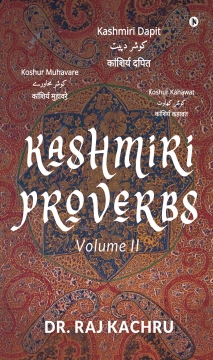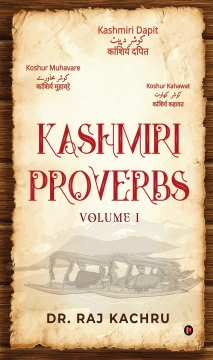
- Discover books
- For Writers
-
For Writers
-
Indie Author Championship
-
Challenges
Writing Contests
- Get Started

"It was a wonderful experience interacting with you and appreciate the way you have planned and executed the whole publication process within the agreed timelines.”
Subrat SaurabhAuthor of Kuch Woh Pal -
-
-
IN
- India
- Singapore
- Malaysia
- 0
Raj Kachru
Dr Raj Kachru, a Kashmiri Pandit, hails from the family of 18th century’s leading Kashmiri Poetess, Arnimal, known for poignant poetry, and Munshi Bhawani Dass Pandit Kachru, an erudite Persian scholar and historian at Rainawari, Srinagar, Kashmir. Raj Kachru did his earlier schooling in the valley, graduated from IIT, Kharagpur, and PhD from MSU, USA. A globe trotter, he has worked in USA, Iran and India, including IIT, Kharagpur. His last position was as the Assistant Director-general (Process Engineering) at ICAR, New Delhi. During his 50+ years of professional career, Raj Kachru has puRead More...
Dr Raj Kachru, a Kashmiri Pandit, hails from the family of 18th century’s leading Kashmiri Poetess, Arnimal, known for poignant poetry, and Munshi Bhawani Dass Pandit Kachru, an erudite Persian scholar and historian at Rainawari, Srinagar, Kashmir. Raj Kachru did his earlier schooling in the valley, graduated from IIT, Kharagpur, and PhD from MSU, USA. A globe trotter, he has worked in USA, Iran and India, including IIT, Kharagpur. His last position was as the Assistant Director-general (Process Engineering) at ICAR, New Delhi.
During his 50+ years of professional career, Raj Kachru has published more than 390 papers and 16 books (the last being Kashmiri Proverbs Vol-1, May 2021), designed and developed 18 prototypes and delivered more than 160 invited lectures in India and abroad. He has received many national and international awards including the prestigious gold medal by the Institution of Engineers (India), ISAE Commendation Medal for R&D and Rajendra Prasad award by the ICAR. Raj Kachru has a passion for literature especially, Urdu, Kashmiri and English poetry, and a love for all types of music and Ghazal singing. At present, he lives in Bhopal with his wife, Madhu (former Professor and Head, Sociology, Post-Graduate Women's College, Bhopal).
Read Less...Crop your profile image

Kashmiri Proverbs Volume II
Books by Dr. Raj Kachru
The proverbs contained in this volume are pithy statements mostly derived from wisdom that expresses traditionally held truths or pieces of advice based on common sense or experiences encapsulating a society's values and beliefs. The beauty of these proverbs lies in the fact that they hold true for all times and are well thought out and honed by our ancestors from time immemorial. Their popular usage in colloquial language and Kashmiri needs no emphasis as the
The proverbs contained in this volume are pithy statements mostly derived from wisdom that expresses traditionally held truths or pieces of advice based on common sense or experiences encapsulating a society's values and beliefs. The beauty of these proverbs lies in the fact that they hold true for all times and are well thought out and honed by our ancestors from time immemorial. Their popular usage in colloquial language and Kashmiri needs no emphasis as they can be seen as ‘spicy jargon’ of Kashmiri language too.
The compilation has 151 new Kashmiri proverbs, each of which is scripted in English, Hindi and Urdu for wider reach and, more importantly, to help the reader in pronouncing it rightly; lest it should lead entirely to a different meaning. Each proverb is annexed with an elaborate description, interpretation and usage with illustrative examples, wherever possible. Readers will find a marked improvement in the quality of the presentation, language and ease of understanding of the proverbs over the first volume. These proverbs are hoped to invoke interesting memories in Kashmiris, in particular, and positive reception from other regions as well, by recapitulating similar proverbs in their respective languages.
Kashmiri Proverbs: Volume 1
Books by Dr. Raj Kachru
This book, written during the pandemic, is the brainchild of the author, based primarily on the Kashmiri sayings the elders used to quote and intersperse during their day-to-day conversations. Such special sayings, the proverbs, are gems of wisdom that give advice about life. Proverbs do reflect and demonstrate national events, social customs and vices, and are found in all languages and societies alike. As rightly said by a Panamanian, “Proverb is to speech
This book, written during the pandemic, is the brainchild of the author, based primarily on the Kashmiri sayings the elders used to quote and intersperse during their day-to-day conversations. Such special sayings, the proverbs, are gems of wisdom that give advice about life. Proverbs do reflect and demonstrate national events, social customs and vices, and are found in all languages and societies alike. As rightly said by a Panamanian, “Proverb is to speech what salt is to food.” Generations have passed, but those proverbs are relevant even today. These proverbs, handed over through word of mouth, might slowly dwindle and vanish from our lives as our future generations are bound to distance themselves from the use of Kashmiri language due to circumstances created by the design, compulsion or choice. This concern prompted me to document these proverbs.
The compilation has 101 Kashmiri proverbs in English, Urdu and Hindi, to ensure better reach. The meaning of each word is annexed with an elaborate description, interpretation and usage with illustrative examples, wherever possible. These proverbs are hoped to invoke interesting memories in Kashmiris, in particular and a positive reception from other regions as well, by recapitulating similar proverbs in their own languages.
Kashmiri Proverbs Volume II
Books by Dr. Raj Kachru
The proverbs contained in this volume are pithy statements mostly derived from wisdom that expresses traditionally held truths or pieces of advice based on common sense or experiences encapsulating a society's values and beliefs. The beauty of these proverbs lies in the fact that they hold true for all times and are well thought out and honed by our ancestors from time immemorial. Their popular usage in colloquial language and Kashmiri needs no emphasis as the
The proverbs contained in this volume are pithy statements mostly derived from wisdom that expresses traditionally held truths or pieces of advice based on common sense or experiences encapsulating a society's values and beliefs. The beauty of these proverbs lies in the fact that they hold true for all times and are well thought out and honed by our ancestors from time immemorial. Their popular usage in colloquial language and Kashmiri needs no emphasis as they can be seen as ‘spicy jargon’ of Kashmiri language too.
The compilation has 151 new Kashmiri proverbs, each of which is scripted in English, Hindi and Urdu for wider reach and, more importantly, to help the reader in pronouncing it rightly; lest it should lead entirely to a different meaning. Each proverb is annexed with an elaborate description, interpretation and usage with illustrative examples, wherever possible. Readers will find a marked improvement in the quality of the presentation, language and ease of understanding of the proverbs over the first volume. These proverbs are hoped to invoke interesting memories in Kashmiris, in particular, and positive reception from other regions as well, by recapitulating similar proverbs in their respective languages.
Kashmiri Proverbs: Volume 1
Books by Dr. Raj Kachru
This book, written during the pandemic, is the brainchild of the author, based primarily on the Kashmiri sayings the elders used to quote and intersperse during their day-to-day conversations. Such special sayings, the proverbs, are gems of wisdom that give advice about life. Proverbs do reflect and demonstrate national events, social customs and vices, and are found in all languages and societies alike. As rightly said by a Panamanian, “Proverb is to speech
This book, written during the pandemic, is the brainchild of the author, based primarily on the Kashmiri sayings the elders used to quote and intersperse during their day-to-day conversations. Such special sayings, the proverbs, are gems of wisdom that give advice about life. Proverbs do reflect and demonstrate national events, social customs and vices, and are found in all languages and societies alike. As rightly said by a Panamanian, “Proverb is to speech what salt is to food.” Generations have passed, but those proverbs are relevant even today. These proverbs, handed over through word of mouth, might slowly dwindle and vanish from our lives as our future generations are bound to distance themselves from the use of Kashmiri language due to circumstances created by the design, compulsion or choice. This concern prompted me to document these proverbs.
The compilation has 101 Kashmiri proverbs in English, Urdu and Hindi, to ensure better reach. The meaning of each word is annexed with an elaborate description, interpretation and usage with illustrative examples, wherever possible. These proverbs are hoped to invoke interesting memories in Kashmiris, in particular and a positive reception from other regions as well, by recapitulating similar proverbs in their own languages.

Are you sure you want to close this?
You might lose all unsaved changes.
Select from one of our global stores to continue
 India
India
 Singapore
Singapore
 Malaysia
Malaysia
Warning Message
The items in your Cart will be deleted, click ok to proceed.












